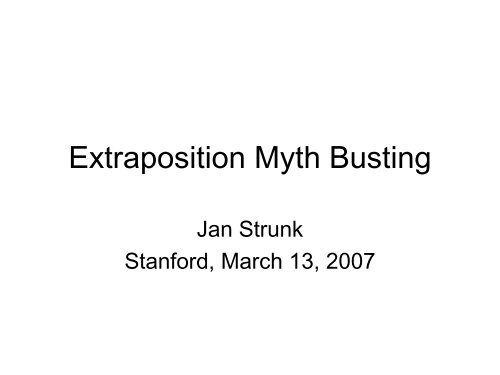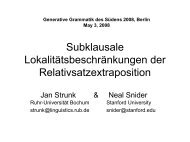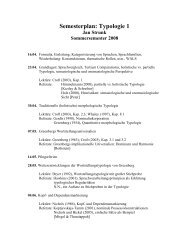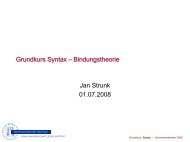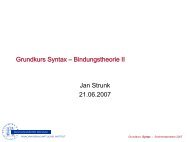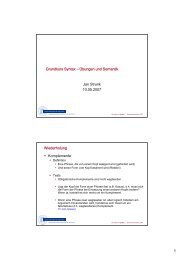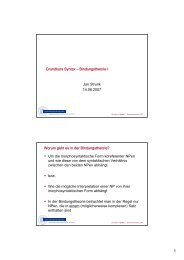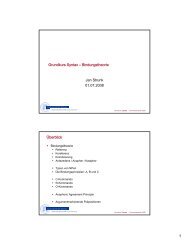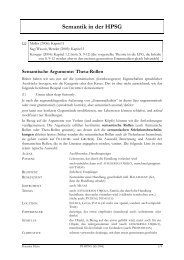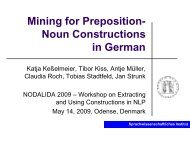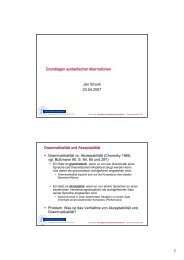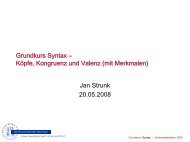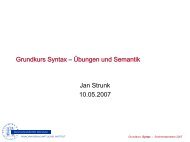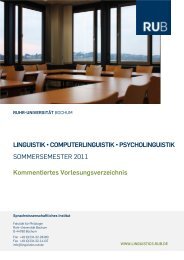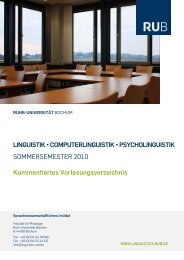Extraposition Myth Busting
Extraposition Myth Busting
Extraposition Myth Busting
Create successful ePaper yourself
Turn your PDF publications into a flip-book with our unique Google optimized e-Paper software.
<strong>Extraposition</strong> <strong>Myth</strong> <strong>Busting</strong><br />
Jan Strunk<br />
Stanford, March 13, 2007
Outline of the Talk<br />
• Introduction<br />
– Relative clause extraposition in English and German<br />
• Constraints on extraposition<br />
– Right Roof Constraint<br />
– Subclausal locality constraints (Subjacency)<br />
– Restrictive vs. appositive relative clauses<br />
– “Indefiniteness” constraint<br />
• Conclusion<br />
– Possible non-syntactic factors<br />
– Alleged differences between English and German
Introduction:<br />
Relative Clause <strong>Extraposition</strong><br />
in English and German
Relative Clause <strong>Extraposition</strong> -<br />
English<br />
• Integrated relative clause (“in situ”)<br />
I met [ DP a girl [ RC who looked like you]] yesterday<br />
(profile.myspace.com/index.cfm?fuseaction=user.viewprofile&friendid=21174003, 03/11/2007)<br />
• Extraposed relative clause<br />
I met [ DP a girl t] yesterday [ RC who had such mermaid hair]<br />
(profile.myspace.com/index.cfm?fuseaction=user.viewprofile&friendid=16025622, 03/11/2007)
Relative Clause <strong>Extraposition</strong> -<br />
English
Relative Clause <strong>Extraposition</strong> -<br />
German<br />
• Integrated relative clause (“in situ”)<br />
Ich habe [ DP alle diesbezüglichen Threads [ RC die ich finden konnte]] gelesen<br />
I have all relevant threads that I find could read<br />
‘I have read all relevant threads that I could find.’<br />
(www.rcforum.de/ftopic6950.html, 03/11/2007)<br />
• Extraposed relative clause<br />
Ich habe [ DP alle Bücher t] gelesen [ RC die ich finden konnte.]<br />
I have all books read that I find could<br />
‘I have read all books that I could find.’<br />
(www.wer-weiss-was.de/theme46/article2357606.html, 03/11/2007)
Relative Clause <strong>Extraposition</strong> -<br />
German
<strong>Extraposition</strong> as a<br />
Syntactic Alternation<br />
• I regard the integrated and extraposed versions of<br />
relative clauses as syntactic variants<br />
– Naturally occurring near minimal pairs can be found<br />
– A given example is often acceptable in both versions<br />
– <strong>Extraposition</strong> has traditionally been regarded as an optional<br />
transformation (sometimes even as a stylistic or phonological<br />
operation) (e.g., Chomsky 1986; Inaba 2005 for German)<br />
• Background on my dissertation project:<br />
– Research on relative clause extraposition in German<br />
– Modeling whether a RC will be realized in the integrated or<br />
extraposed variant<br />
– Modeling how attachment ambiguities of (extraposed) RCs<br />
can be resolved
The Locality of<br />
Relative Clause <strong>Extraposition</strong>
Ross’s Right Roof Constraint<br />
• “The fact is that an extraposed clause may never be moved outside<br />
"the first sentence up", in the obvious interpretation of this phrase.“<br />
(Ross 1986, p. 5)<br />
• “Any rule whose structural index is of the form ... A Y, and whose<br />
structural change specifies that A is to be adjoined to the right of Y,<br />
is upward bounded.”<br />
(Ross 1986, p. 179)<br />
• “*[ CP [ CP That Sam didn't pick [ DP those packages t] up] is possible]<br />
[ RC which are to be mailed tomorrow.]” (Ross 1986, p. 166)<br />
• Stefan Müller and Frank Richter (p.c.) suggest that this is not an<br />
absolute constraint, but natural counterexamples are hard to find.
Subjacency<br />
• Chomsky (1973) claims that:<br />
– <strong>Extraposition</strong> obeys stricter constraints than Ross’s Right Roof Constraint,<br />
– Namely, the same subclausal locality constraints that leftward extraction does<br />
• Chomsky (1973) and also Akmajian (1975) assume that the set of cyclic<br />
nodes includes S (IP) and NP (DP)<br />
• Predicts that extraposition “out of” a noun phrase embedded in another<br />
noun phrase is impossible (since only one NP boundary can be crossed)
Generalized Subjacency<br />
• Baltin (1981, 1983, 2006) claims that extraposition obeys even stricter<br />
subclausal locality constraints than leftward extraction:<br />
• Predicts that only one maximal projection can intervene between an<br />
extraposed relative clause and its “in situ” position<br />
(this maximal projection is already exhausted by the antecedent NP/DP)
Generalized Subjacency<br />
• Generalization (Baltin 2006, p. 241):<br />
“An extraposed phrase is adjoined to the first<br />
maximal projection that dominates the phrase in<br />
which it originates.”<br />
• See also Akmajian (1975), Asakawa (1979),<br />
Jacobson (1987), and Rochemont and Culicover<br />
(1997) for English, Wiltschko (1997) for German,<br />
and Keller (1995) for both languages.
<strong>Extraposition</strong> from within PP<br />
• Baltin admits that extraposition from within PP is a<br />
problem for Generalized Subjacency<br />
(Baltin 2006, p. 246)<br />
“I saw it [ PP in [ DP a magazine t]] yesterday<br />
[ RC which was lying on the table.]”<br />
• But he claims that extraposition from within a fronted PP<br />
is ungrammatical (Baltin 2006, p. 246)<br />
“*[ PP In [ DP which magazine t]] did you see it<br />
[ RC which was lying on the table?]”
Counterexamples - English<br />
• There is a systematic class of counterexamples,<br />
however, both in English and in German<br />
[ PP In [ DP what noble capacity t]] can I serve him<br />
[ RC that would glorify him and magnify his name]?<br />
(www.christianinconnect.com/lp1pet.htm, 02/19/2007)<br />
If you need to manage your anger,<br />
[ PP in [ DP what ways t]] can you do that<br />
[ RC which would allow you to continue to function]?<br />
(www.positivearticles.com/Article/Top-Ten-Ways-of-Moving-Through-<br />
Anger/5832, 02/19/2007)
<strong>Extraposition</strong> from within PP<br />
“Prepositional phrases and adverbs in the<br />
prefield, for instance, are particularly inhospitable<br />
to RCE. Not a single case of RCE with an initial<br />
PP head was found, as opposed to the frequent<br />
application of RCE with PPs in the middle field.<br />
Furthermore, attempts to apply RCE in such<br />
cases resulted in crashingly ungrammatical<br />
outputs.”<br />
(Shannon 1992, p. 267)
Counterexamples - German<br />
[ PP in [ NP welches SKigebiet t]] kann man über die Osterferien fahren<br />
in what skiing region can one over the spring break drive<br />
[ RC das noch Schneesicher ist] ...<br />
that still snow-sure is<br />
‘In what skiing region can you travel over spring break that is<br />
guaranteed to have snow?’<br />
(www.bergfex.at/forum/allgemein/?&msgID=1000049637, 02/19/2007)<br />
[ PP An [ NP wen t]] kann ich mich wenden,<br />
to whom can I myself turn<br />
[ RC der mir kluge Tips aus der Praxis geben kann?]<br />
who me clever tips from the practice give can<br />
‘To whom can I turn who can give me clever tips from practice?’<br />
(www.ruhr-uni-bochum.de/beratungsportal/chat/doku14b.htm, 02/19/2007)
Intermediate Summary<br />
• <strong>Extraposition</strong> from within PP seems to be<br />
possible both in English and in German<br />
• This is also true for fronted PPs outside<br />
the VP<br />
• Baltin’s Generalized Subjacency Principle<br />
is therefore falsified (unless one excludes<br />
P from the set of major categories)
Chomsky’s Subjacency<br />
• Chomsky (1973) predicts that relative clause<br />
extraposition from an NP embedded inside<br />
another NP is ungrammatical<br />
• This is explicitly argued for with regard to PP<br />
extraposition by Akmajian (1975, p. 118)<br />
“[ DP A photograph t] was published last year [ PP of a book about French<br />
cooking.]”<br />
“*[ DP A photograph [ PP of [ DP a book t]]] was published last year [ PP about<br />
French cooking.]”
Counterexamples - English<br />
• Counterexample from Uszkoreit (1990, p. 2333)<br />
“[ DP Only letters [ PP from [ DP those people t]]] remained<br />
unanswered [ RC that had received our earlier reply.]”<br />
• Naturally occurring examples<br />
We drafted [ DP a list [ PP of [ DP basic demands t]]] that night<br />
[ RC that had to be unconditionally met or we would stop<br />
making and delivering pizza and go on strike.]<br />
(portland.indymedia.org/en/2005/07/321809.shtml, 02/22/2007)<br />
A wreath was placed [ PP in [ DP the doorway of [ DP the brick<br />
rowhouse t]]] yesterday, [ RC which is at the end of a block<br />
with other vacant dwellings.]<br />
(http://www.firerescue1.com/DutyDeaths/278039/, 02/22/2007)
Counterexamples - German<br />
• Constructed example by Müller (2004)<br />
Karl hat mir [ DP eine Kopie [ DP einer Fälschung [ DP des Bildes<br />
Karl has me a copy a.GEN forgery the.GEN painting<br />
[ DP einer Frau t]]]] gegeben, [ RC die schon lange tot ist.]<br />
a.GEN woman given who already long dead is<br />
‘Karl gave me a copy of a forgery of the painting of a woman who has<br />
been dead for a long time.’<br />
• Other authors also claim that such examples are<br />
grammatical in German: Haider (1997), Kiss<br />
(2005), Müller & Meurers (2006) and others.
Counterexamples - German<br />
Ich habe [ DP einen Bericht [ PP von [ DP einer Patientin t]]]<br />
I have a report of a patient<br />
gesehen [ RC die von der Schulmedizin aufgegeben wurde]<br />
seen who by the scientific medicine given up was<br />
‘I have seen a report about a patient who was given up by scientific<br />
medicine.’<br />
(www.krebs-kompass.org/Forum/showthread.php?t=4697, 02/27/2007)<br />
Und dann sollte ich [ DP Augenzeuge [ DP der Zerstörung<br />
and then should I eye witness the.GEN destruction<br />
[ DP einer Stadt t]]] werden, [ RC die mir am Herzen lag] - Sarajevo.<br />
a.GEN city become that me at the heart lay Sarajevo<br />
‘And then I was about to become an eye witness of the destruction<br />
of a city that was dear to my heart – Sarajevo.’<br />
(Tübinger Baumbank des Deutschen / Schriftsprache (TüBa-D/Z), sentence 16294)
Intermediate Summary<br />
• <strong>Extraposition</strong> from an NP embedded inside another NP has been<br />
argued to be grammatical in German by some authors<br />
• Natural English and German examples can indeed be found in<br />
corpora<br />
• Baltin’s Generalized Subjacency is therefore falsified by the<br />
empirical data:<br />
An extraposed RC is not always adjoined to the first maximal<br />
projection containing its antecedent.<br />
• Chomsky’s (1973) version of Subjacency is also falsified<br />
(if NP is taken to be a cyclic node)
Intermediate <strong>Extraposition</strong><br />
• German has a small class of postpositions such as<br />
“gegenüber” (against, towards)<br />
Die Annahme muss [ PP [ DP demjenigen, [ RC der das Angebot gemacht<br />
the acceptance must that person who the offer made<br />
hat,]] gegenüber] erklärt werden.<br />
has towards declared be<br />
‘Acceptance must be declared to the person who has made the offer.’<br />
(www.123recht.net/article.asp?a=113, 02/25/2007)<br />
• A relative clause can either appear before the<br />
postposition, after the postposition, or at the end of the<br />
clause
Intermediate <strong>Extraposition</strong><br />
Aber [ PP [ DP den Tieflieger-Piloten t] gegenüber, [ RC die auf alles<br />
but the strafer pilots against who on everything<br />
schossen, was sich bewegte,]] gab es schon Haßgefühle.<br />
shot that itself moved were there of course feelings of hatred<br />
‘But there were of course feelings of hatred against the strafer pilots<br />
who shot at everything that moved.’<br />
(www.geschichtsforum.de/showthread.php?p=231275, 02/24/2007)<br />
Das ist [ PP [ DP denen t] gegenüber] extrem unfair [ RC die sich<br />
that is those against extremely unfair who themselves<br />
die Mühe machen auf so einen Mist zu antworten.]<br />
the trouble make to such a rubbish to answer<br />
‘That is extremely unfair against those who go through the trouble of<br />
answering such rubbish.’<br />
(www.homepage -forum.de/showthread.php?t=22168, 02/24/2007)
Chomsky’s Barriers Approach<br />
• Chomsky (1986, p. 14) makes a revised proposal which<br />
incorporates the distinction between arguments and adjuncts:<br />
• Again, two barriers are needed to render extraposition illicit<br />
• This predicts that extraposition from a DP that is contained in some<br />
kind of adjunct (of another DP, for example) is ungrammatical
Chomsky’s Barriers Approach<br />
Adjunct Barrier<br />
Barrier by inheritance
Chomsky’s Barriers Approach<br />
• Chomsky (1986, p. 40) argues that the RC in the following example<br />
can only modify the higher NP (i.e., it can only originate from position<br />
t’ and not from t)<br />
[ DP many books [ PP with [ DP stories t]] t'] were sold<br />
[ RC that I wanted to read]<br />
• Müller (2004, p. 10) argues that structurally equivalent examples in<br />
German are in fact grammatical with unambiguous attachment of the<br />
RC to the embedded DP<br />
weil [ DP viele Schallplatten [ PP mit [ DP Geschichten t]]]<br />
because many records with stories<br />
verkauft wurden [ RC die ich noch lesen wollte]<br />
sold were that I still read wanted<br />
‘because many records with stories were sold that I still wanted to read’
Counterexamples - English<br />
I'm reading [ DP a book [ PP about [ DP Elliott Smith t]]]<br />
right now, [ RC who killed himself]]<br />
(www.songmeanings.net/lyric.php?lid=3530822107858518290, 02/28/2007)<br />
For example, we understand that Ariva buses have won<br />
[ DP a number [ PP of [ DP contracts [ PP for [ DP routes<br />
[ PP in [ DP London]] t ]]]]] recently, [ RC which will not be run<br />
by low floor accessible buses.]<br />
(http://www.publications.parliament.uk/pa/cm199899/cmselect/cmenvtra/32ii/32115.htm,<br />
02/24/2007)
Counterexamples - German<br />
… hielt sie vor allem [ DP das Andenken [ PP an [ DP “die gute alte Zeit”<br />
held she above all the memory of the good old time<br />
[ PP unter [ DP ihrem verstorbenen Mann t]]]]] hoch, [ RC der im<br />
under her deceased husband high who in the<br />
Mittelpunkt ihres Wahlkampfes stand.]<br />
center of her campaign stood<br />
‘… she mostly kept the memory of the good old times under her<br />
deceased husband alive who was at the center of her election<br />
campaign.’<br />
(Tübinger Baumbank des Deutschen / Schriftsprache (TüBa-D/Z), sentence 12507)
Counterexamples - German<br />
Statt Unsummen [ PP in [ DP Sicherheitsstudien [ PP für<br />
Instead of enormous sums into security studies for<br />
[ DP Atomkraftwerke t]]]] zu stecken, [ RC die ohnehin nicht nachgerüstet<br />
nuclear power plants to put that anyway not upgraded<br />
werden können,] …<br />
be can<br />
‘Instead of investing enormous sums into security studies for nuclear<br />
power plants that cannot be upgraded anyway …’<br />
(Tübinger Baumbank des Deutschen / Schriftsprache (TüBa-D/Z), sentence 20483)
Counterexamples - German<br />
… er habe damals einem Kollegen Wüppesahls … [ DP den Karton<br />
he has at that time a colleague Wüppesahl’s … the carton<br />
[ PP mit [ DP den 68 Vorgängen t]]] übergeben, [ RC die dieser angeblich<br />
with the 68 transactions handed over which he allegedly<br />
mit in sein Urlaubsdomizil in Österreich nehmen wollte.]<br />
with in his holiday residence in Austria take wanted<br />
‘that he had then handed over to a colleague of Wüppesahl’s<br />
the carton with the 68 transactions which he allegedly wanted to take<br />
with him to his holiday residence in Austria.’<br />
(Tübinger Baumbank des Deutschen / Schriftsprache (TüBa-D/Z), sentence 21243)
Intermediate Summary<br />
• Counterexamples against Chomsky’s Barriers approach<br />
can be found both in German and English<br />
• <strong>Extraposition</strong> is possible “out of” multiply embedded DPs<br />
• No subclausal locality constraint proposed so far is<br />
compatible with the counterexamples I have presented<br />
• The null hypothesis should be that there is no syntactic<br />
subclausal constraint on extraposition<br />
• More systematic empirical research is needed
Preliminary Statistics<br />
• German newspaper corpus<br />
TüBa-D/Z<br />
• 2,789 relative clauses<br />
• Likelihood of RC extraposition<br />
decreases with deeper<br />
embedding<br />
• But the decrease is very<br />
gradual:<br />
– Embedding 0 – 25.4 %<br />
– Embedding 1 – 23.9 %<br />
– Embedding 2 – 15.5 %<br />
– Embedding 3 – 13.4 %<br />
– Embedding 4 – 8.7 %<br />
– Embedding 5-8 – 0 %
Restrictive vs. Appositive<br />
Relative Clauses
Ziv and Cole (1974)<br />
• There seems to be a (widespread?) belief that only restrictive<br />
relative clauses can be extraposed<br />
• This belief possibly originates in a paper by Ziv and Cole (1974):<br />
“Appositive relative clauses cannot be extraposed.” (p. 773)<br />
“*[ DP John Smith t] is here [ RC who has three ears.]”<br />
“*[ DP A boy t] was here, [ RC whom I had never seen before.]”<br />
“*[ DP My father t] just came in, [ RC who runs his own business]”<br />
(Ziv and Cole 1974, pp. 777-779)
Ziv and Cole (1974)<br />
• Ziv and Cole distinguish between two types of<br />
nonrestrictive relative clauses:<br />
– Appositive relative clauses (p. 776)<br />
“Appositives are non-restrictive relative clauses which are used<br />
in apposition to the head Noun Phrase […]. There seem to be<br />
very weak contextual requirements on the relevance of the<br />
appositive to the main assertation of the sentence in which it is<br />
embedded.”<br />
“[ DP John Smith, [ RC who is my instructor,]] is very sick.”
Ziv and Cole (1974)<br />
– Continuative relative clauses (Ziv and Cole 1974, pp. 776, 777)<br />
“Continuative relative clauses, on the other hand, are nonrestrictive<br />
relative clauses which usually occur at the end of the<br />
sentence, bear some logical (or often causal or temporal)<br />
relation to the matrix sentence and thus serve as appropriate<br />
continuations of that which was said in the sentence to which<br />
they are appended.“<br />
“I gave the book to [ DP my mother], [ RC who gave it to<br />
[ DP my sister]], [ RC who returned it to the library.]”
Ziv and Cole (1974)<br />
• According to Ziv and Cole appositive<br />
relative clauses cannot be extraposed<br />
• They also assume that proper names<br />
cannot be modified by restrictive relative<br />
clauses (p. 779)
Counterexamples - English<br />
Dan Bailey got it and [ DP Bob Leatherman t] called me,<br />
[ RC who was the head of distributor relations for us]<br />
(http://www.amquix.info/scheibeler.html, 03/13/2007)<br />
In 1999 [ DP Bill Wyman t] called me, [ RC who I'd also known right back to<br />
the seventies,] and he told me about the Rhythm Kings band.<br />
(http://www.cultfound.org/back door colin bass guitar mag interview.htm, 03/13/2007)<br />
I swam in [ DP Lake Ontario] yesterday, [ RC which is my second<br />
Great Lake of the trip.]<br />
(www.coolgrrrls.com/pages/mar.html, 03/13/2007)<br />
I had [ DP a memory [ PP of [ DP my dear old grandma t]]] yesterday<br />
[ RC who used to buy the EXACT same outfit in every color available<br />
(down to the shoes!).]<br />
(www.sandysknitting.com/archives/000658.html, 02/22/2007)
Counterexamples - German<br />
Einmal nickt er [ DP Schröder t] zu, [ RC der zurückgelehnt und mit<br />
once nods he Schröder to who leaned back and with<br />
übereinandergeschlagenen Beinen auf seinem Stuhl sitzt,] …<br />
crossed legs on his chair sits<br />
‘Once he nods to Schröder, who is leaning back and is sitting with<br />
legs crossed on his chair’<br />
(Tübinger Baumbank des Deutschen / Schriftsprache (TüBa-D/Z), sentence 3050)<br />
Allerdings habe er mit [ DP Prodi t] gesprochen, [ RC zu dem er "ein<br />
however has he with Prodi talked to who he a<br />
enges und intensives Verhältnis" pflege.]<br />
close and intensive relationship cultivates<br />
‘However, he has spoken with Prodi, with who he has a close and<br />
intensive relationship.’<br />
(Tübinger Baumbank des Deutschen / Schriftsprache (TüBa-D/Z), sentence 10665)
Counterexamples - German<br />
Die neuen Tageszeitungen sollen sich nur aus [ DP Anzeigen t]<br />
the new newspapers shall themselves only from ads<br />
finanzieren, [ RC die rund 55 Prozent der Zeitung ausmachen.]<br />
finance which about 55 percent the.GEN newspaper make up<br />
‘The new daily newspapers are supposed to finance themselves from<br />
ads, which make up about 55 percent of the paper.<br />
(Tübinger Baumbank des Deutschen / Schriftsprache (TüBa-D/Z), sentence 4615)<br />
Immerhin hatte er bis dahin [ DP alle Entlassungsaktionen t] überstanden,<br />
after all had he till then all layoffs survived<br />
[ RC bei denen seit 1990 mehr als 2.100 Leute gehen mußten.]<br />
in which since 1990 more than 2,100 people go must<br />
‘After all, he had survived all layoffs till then, in which more than 2,100<br />
people had had to leave since 1990.’<br />
(Tübinger Baumbank des Deutschen / Schriftsprache (TüBa-D/Z), sentence 2661)
Intermediate Summary<br />
• Examples parallel to Ziv and Cole’s appositive<br />
examples can be found in which the RC is<br />
extraposed<br />
• It seems that the generalization that appositive<br />
relative clauses cannot be extraposed is wrong<br />
We met with [ DP our vet t] yesterday – [ RC who by the way is a holistic<br />
vet and does prescribe Metacam as a "last resort".]<br />
(http://www.arthritis-cats-dogs.com/cgi-bin/datacgi/database.cgi?file=Forum&<br />
report=Subtopic&SubtopicID=00000699&firstrecord=0&finalrecord=14, 03/13/2007)
Preliminary Statistics<br />
• German newspaper corpus<br />
TüBa-D/Z<br />
• 2,789 relative clauses<br />
• <strong>Extraposition</strong> of nonrestrictive<br />
RCs is indeed less<br />
likely than extraposition<br />
of restrictive RCs<br />
• But this is in no way<br />
categorical: 18 % of<br />
nonrestrictive relative clauses<br />
are extraposed vs. 28 % of<br />
restrictive relative clauses<br />
• (No distinction between<br />
appositives and continuatives)
The Indefiniteness Constraint
The Indefiniteness Constraint<br />
• Many authors also believe that DPs with a simple definite article or a<br />
demonstrative or DPs containing proper names cannot be modified<br />
by an extraposed relative clause<br />
• Guéron and May (1984) propose a theory in which relative clause<br />
extraposition is mediated by Quantifier Raising<br />
(Fox and Nissenbaum (1999) is a modern incarnation of this idea)<br />
“a. I read [ DP a book t] during the vacation [ RC which was<br />
written by Chomsky.]<br />
b. * I read [ DP that book t] during the vacation [ RC which was<br />
written by Chomsky.]”
The Indefiniteness Constraint<br />
• While Baltin (2006, p. 243) gives the following counterexample to<br />
Guéron and May’s (1984) claims<br />
“[ DP Those students t] will pass this course [ RC who complete all of<br />
their assignments on time.]”<br />
• He still states that:<br />
“It is, however, impossible, it seems, to improve a nominal that is<br />
introduced by a pure definite article as an extraposition host.”<br />
(Baltin 2006, p. 243)<br />
“*[ DP The man t] showed up [ RC that hated Chomsky.]”
Counterexamples - English<br />
• However, it is easy to find counterexamples in which the<br />
antecedent DP is located inside the VP<br />
I met [ DP the guy t] yesterday [ RC who presently owns the house<br />
that I am buying.]<br />
(www.houseoffusion.com/groups/CF-Community/thread.cfm/threadid:15674, 03/13/2007)<br />
I just met [ DP the co-surgeon t] yesterday [ RC who will be moving<br />
my organs.]<br />
(www.scoliosis.org/forum/showthread.php?t=4204, 03/13/2007)<br />
Pope John Paul II met with [ DP the actor t] yesterday [ RC who played<br />
Jesus in the movie The Passion of the Christ.]<br />
(http://catholicism.about.com/b/a/2004_03_16.htm, 03/13/2007)
Counterexamples - English<br />
• <strong>Extraposition</strong> from definite subject DPs is also possible<br />
Later [ DP the guy t] showed up [ RC who was supposed to come out here<br />
(in a “couple of days”) last month.]<br />
(www.43things.com/things/view/407953, 03/13/2007)<br />
[ DP The car t] broke down [ RC that was going to pick up my wife to be!]<br />
(answers.yahoo.com/question/index?qid=20060929091928AAG5z7p, 03/13/2007)<br />
Cooper failed to mention to the reporter that he alread had the<br />
bodyguard before [ DP the woman t] showed up [ RC who had sent the bear.]<br />
(gettingitoffmychest.blogspot.com/2005/11/anderson-cooper-unanchored.html, 03/13/2007)
Counterexamples - German<br />
Man muß vor allem [ DP die Leute t] stützen, [ RC die die leiseren<br />
one must particularly the people support who the quieter<br />
Themen gründlich bearbeiten.]<br />
subjects thoroughly work on<br />
‘One particularly has to support the people that work thoroughly<br />
on the less spectacular subjects.’<br />
(Tübinger Baumbank des Deutschen / Schriftsprache (TüBa-D/Z), sentence 1421)<br />
Er stellte [DP das Spiel t] nach, [RC das kleine Mädchen spielen, …]<br />
he re-enacts the game PART that little girls play<br />
‘He re-enacts the game that little girls play…’<br />
(Tübinger Baumbank des Deutschen / Schriftsprache (TüBa-D/Z), sentence 1377)
Counterexamples - German<br />
als sie endlich selbst über [ DP die Musik t] erzählen darf,<br />
when she finally herself about the music tell may<br />
[ RC die sie macht.]<br />
that she makes<br />
‘when she finally is allowed to speak herself about the music<br />
that she makes.’<br />
(Tübinger Baumbank des Deutschen / Schriftsprache (TüBa-D/Z), sentence 279)<br />
Mit Skepsis blicken die Angestellten aus dem Depot durch das blaue<br />
With skepticism look the employees from the depot through the blue<br />
Stahltor in [ DP den Bunkerteil t] herüber, [ RC in dem Kresnik probt.]<br />
steel gate into the bunker part over in which Kresnik rehearses<br />
‘With skepticism, the employees look from the depot through the blue<br />
steel gate into the part of the bunker in which Kresnik is rehearsing.’<br />
(Tübinger Baumbank des Deutschen / Schriftsprache (TüBa-D/Z), sentence 1339)
Intermediate Summary<br />
• There are grammatical examples of RC<br />
extraposition from simple definite DPs<br />
– Both from subjects and from DPs inside the<br />
VP<br />
– Both in English and German<br />
• There is no categorical syntactic or<br />
semantic constraint against extraposition<br />
from definite (or non-quantificational) DPs
Preliminary Statistics<br />
• German newspaper corpus<br />
TüBa-D/Z<br />
• 2,789 relative clauses<br />
• <strong>Extraposition</strong> from<br />
definite DPs is indeed less<br />
likely than extraposition<br />
from indefinite DPs<br />
• But this is in no way<br />
categorical: 19 % of relative<br />
clauses with a definite<br />
antecedent are extraposed<br />
vs. 30 % of relative clauses<br />
with an indefinite antecedent
Conclusion
Syntactic Constraints vs.<br />
Nonsyntactic Factors<br />
• There are no convincing categorical syntactic or<br />
semantic constraints on extraposition<br />
(except possibly for Ross’s Right Roof Constraint)<br />
• In principle, an extraposed relative clause can modify<br />
any DP inside the clause it is adjoined to<br />
• However, there are noncategorical information structure<br />
constraints and also processing constraints on<br />
extraposition
Possible Non-Syntactic Factors<br />
• Extraposed RC mostly modify the focus of the sentence<br />
(Shannon 1992)<br />
– Subjacency: embedded DPs are harder to focus<br />
(even harder for adjuncts than for arguments)<br />
– Indefiniteness constraint: focussed DPs are often<br />
indefinite<br />
• Intervening material cannot be focussed (Takami 1998)<br />
– It is important to control for the type of intervening material<br />
• Increasing linear distance between DP and extraposed<br />
RC makes extraposition less likely (Uszkoreit et al. 1998)<br />
• Hypothesis: <strong>Extraposition</strong> should not split a topic into two<br />
parts
Alleged Differences between<br />
English and German<br />
• Inaba (2005) has suggested that RC extraposition in German and<br />
English are two totally different types of phenomena<br />
– <strong>Extraposition</strong> in English is syntactic movement<br />
– <strong>Extraposition</strong> in German is a phonological operation<br />
• Typical examples examined in the two languages differ<br />
– German:<br />
• Intervening material: final verb<br />
• Small linear distance between antecedent and RC<br />
– English:<br />
• Intervening material: some kind of adverb or the whole VP<br />
• Often greater linear distance between antecedent and RC<br />
• Often “verbs of appearance” which allow the subject to be the focus
Alleged Differences between<br />
English and German<br />
• Typical German example (Kiss 2005, p. 285)<br />
Man hatte [ DP den Boten t] beschimpft, [ RC der den Befehl überbrachte.]<br />
they had the messenger insulted who the command delivered<br />
‘They had insulted the messenger who delivered the command.’<br />
• Typical English examples (Baltin 2006, p. 237)<br />
[ DP a book t] appeared [ RC which was written by Chomsky.]<br />
• More frequent discussion of violations of Subjacency and<br />
the “indefiniteness” constraint in the literature on German<br />
is probably due to the different nature of the typical<br />
examples in English and German
Conclusion<br />
• “Traditional” assumptions about constraints on extraposition are not<br />
justified by the empirical data.<br />
• More systematic research is needed!<br />
• For my dissertation, I am trying to build a model of the choice<br />
between the integrated and the extraposed variants in German<br />
– Based on ~2,600 examples from the TüBa-D/Z<br />
– Annotated with syntactic, semantic, and information structural<br />
information as well as, e.g., linear distance<br />
• I am currently running a pilot on the influence of Subjacency on<br />
reading time and acceptability together with Neal Snider and I hope<br />
to obtain comparative data from English and German.
Thank you!
Literature<br />
Akmajian, A. (1975). More evidence for an NP cycle. Linguistic Inquiry 6 (1), 115-129.<br />
Asakawa, T. (1979). Where does the extraposed element move to? Linguistic Inquiry 10, 505-508.<br />
Baltin, M. R. (1981). Strict bounding. In C. L. Baker and J. McCarthy (Eds.), The Logical Problem of<br />
Language Acquisition, pp. 257-295. MIT Press, Cambridge, USA.<br />
Baltin, M. R. (1983). <strong>Extraposition</strong>: Bounding versus government-binding. Linguistic Inquiry 14 (1),<br />
155-162.<br />
Baltin, M. R. (2006). <strong>Extraposition</strong>. In M. Everaert and H. C. van Riemsdijk (Eds.), The Blackwell<br />
Companion to Syntax, Volume 2, pp. 237-271. Blackwell, Malden, Massachusetts.<br />
Chomsky, N. (1973). Conditions on transformations. In S. R. Anderson and P. Kiparsky (Eds.), A<br />
Festschrift for Morris Halle, pp. 232-286. Holt, Rinehart and Winston, New York.<br />
Chomsky, N. (1986). Barriers, Volume 13 of Linguistic Inquiry Monographs. MIT Press, Cambridge,<br />
Massachusetts.<br />
Fox, D. and Nissenbaum, J. (1999). <strong>Extraposition</strong> and scope: A case for overt QR. In S. Bird, A.<br />
Carnie, J. D. Haugen, and P. Norquest (Eds.), Proceedings of the 18th West Coast Conference<br />
on Formal Linguistics, pp. 132-144. Cascadilla Press, Somerville.<br />
Guéron, J. and May, R. (1984). <strong>Extraposition</strong> and Logical Form. Linguistic Inquiry 15(1), 1-31.<br />
Haider, H. (1997). <strong>Extraposition</strong>. In D. Beerman, D. LeBlanc, and H. van Riemsdijk (Eds.), Rightward<br />
Movement, pp. 115-151. John Benjamins Publishing, Amsterdam.<br />
Inaba, J. (2005). <strong>Extraposition</strong> and the directionality of movement. In S. Blaho, L. Vicente, and E.<br />
Schoorlemmer (Eds.), Proceedings of ConSOLE XIII, pp. 157-169.
Literature<br />
Jacobson, P. (1987). Phrase structure, grammatical relations, and discontinuous constituents. In G. J.<br />
Huck and A. E. Ojeda (Eds.), Discontinuous Constituency, Volume 20 of Syntax and Semantics,<br />
pp. 27-69. Academic Press, Orlando, USA.<br />
Keller, F. (1995). Towards an account of extraposition in HPSG. Proceedings of the 7th Conference of<br />
the European Chapter of the Association for Computational Linguistics, March 27-31, 1995,<br />
University College Dublin, Ireland, pp. 301-306.<br />
Kiss, T. (2005). Semantic constraints on relative clause extraposition. Natural Language and Linguistic<br />
Theory 23, 281-334.<br />
Müller, S. (2004). Complex NPs, subjacency, and extraposition. Snippets 8, 10-11.<br />
Müller, S. and W. D. Meurers (2006). Corpus evidence for syntactic structures and requirements for<br />
annotations of tree banks. In Proceedings of the International Conference on Linguistic Evidence,<br />
Tübingen. http://ling.osu.edu/~dm/papers/mueller-meurers-06.html.<br />
Rochemont, M. S. and P. W. Culicover (1997). Deriving dependent right adjuncts in English. In D.<br />
Beerman, D. LeBlanc, and H. van Riemsdijk (Eds.), Rightward Movement, Volume 17 of Linguistik<br />
aktuell, pp. 279-300. John Benjamins Publishing, Amsterdam.<br />
Ross, J. R. (1986). Infinite Syntax! Ablex Publishing, Norwood, New Jersey. (Based on his MIT<br />
dissertation of the year 1967: Constraints on Variables in Syntax)
Literature<br />
Shannon, T. F. (1992). Toward an adequate characterization of relative clause extraposition in modern<br />
German. In I. Rauch, G. F. Carr, and R. L. Kyes (Eds.), On Germanic Linguistics. Issues and<br />
Methods, pp. 253-281. Mouton de Gruyter, Berlin/New York.<br />
Takami, K.-I. (1998). A functional constraint on extraposition from NP. In A. Kamio and K.-I. Takami<br />
(Eds.), Function and Structure. In Honor of Susumu Kuno (Pragmatics & Beyond. New Series 59),<br />
pp. 23-56, John Benjamins Publishing, Amsterdam.<br />
Tübinger Baumbank des Deutschen (TüBa-D/Z), Seminar für Sprachwissenschaft, Eberhard Karls<br />
Universität Tübingen, http://www.sfs.uni-tuebingen.de/de_tuebadz.shtml<br />
Uszkoreit, H. (1990). <strong>Extraposition</strong> and adjunct attachment in categorial unification grammar. In W.<br />
Bahner, J. Schildt, and D. Viehweger (Eds.), Proceedings of the Fourteenth International<br />
Congress of Linguists, Berlin/GDR, August 10-15, 1987, Volume III, pp. 2331-2336, Akademie-<br />
Verlag, Berlin.<br />
Uszkoreit, H., Brants, T., Duchier, D., Krenn, B., Konieczny, L., Oepen, S., and Skut, W. (1998).<br />
Studien zur performanzorientierten Linguistik: Aspekte der Relativsatzextraposition im Deutschen.<br />
Kognitionswissenschaft 7, 129-133.<br />
Wiltschko, M. (1997). <strong>Extraposition</strong>, identification and precedence. In D. Beerman, D. LeBlanc, and H.<br />
van Riemsdijk (Eds.), Rightward Movement, Volume 17 of Linguistik aktuell, pp. 357-395. John<br />
Benjamins Publishing, Amsterdam.<br />
Ziv, Y. and Cole, P. (1974). Relative extraposition and the scope of definite descriptions in Hebrew<br />
and English. In M. W. La Galy, R. A. Fox, and A. Bruck (Eds.), Papers from the Tenth Regional<br />
Meeting of the Chicago Linguistic Society, April 19--21, 1974, pp. 772-786. Chicago Linguistic<br />
Society, Chicago.


